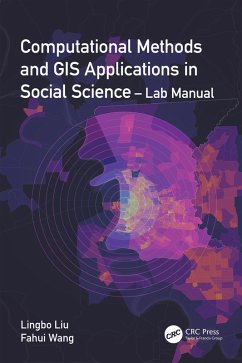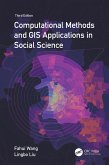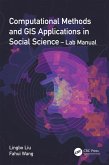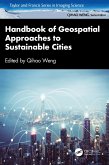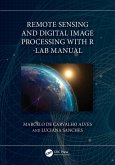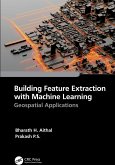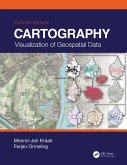Lingbo Liu, Fahui Wang
Computational Methods and GIS Applications in Social Science - Lab Manual (eBook, ePUB)
52,95 €
52,95 €
inkl. MwSt.
Sofort per Download lieferbar

26 °P sammeln
52,95 €
Als Download kaufen

52,95 €
inkl. MwSt.
Sofort per Download lieferbar

26 °P sammeln
Jetzt verschenken
Alle Infos zum eBook verschenken
52,95 €
inkl. MwSt.
Sofort per Download lieferbar
Alle Infos zum eBook verschenken

26 °P sammeln
Lingbo Liu, Fahui Wang
Computational Methods and GIS Applications in Social Science - Lab Manual (eBook, ePUB)
- Format: ePub
- Merkliste
- Auf die Merkliste
- Bewerten Bewerten
- Teilen
- Produkt teilen
- Produkterinnerung
- Produkterinnerung

Bitte loggen Sie sich zunächst in Ihr Kundenkonto ein oder registrieren Sie sich bei
bücher.de, um das eBook-Abo tolino select nutzen zu können.
Hier können Sie sich einloggen
Hier können Sie sich einloggen
Sie sind bereits eingeloggt. Klicken Sie auf 2. tolino select Abo, um fortzufahren.

Bitte loggen Sie sich zunächst in Ihr Kundenkonto ein oder registrieren Sie sich bei bücher.de, um das eBook-Abo tolino select nutzen zu können.
This lab manual is a companion to the third edition of the textbook Computational Methods and GIS Applications in Social Sciences . It uses an open-source platform, KNIME, to illustrate a step-by-step implementation of each case study in the book. Could also be used as a GIS automation reference for advanced users in spatial analysis.
- Geräte: eReader
- mit Kopierschutz
- eBook Hilfe
Andere Kunden interessierten sich auch für
![Computational Methods and GIS Applications in Social Science (eBook, ePUB) Computational Methods and GIS Applications in Social Science (eBook, ePUB)]() Fahui WangComputational Methods and GIS Applications in Social Science (eBook, ePUB)121,95 €
Fahui WangComputational Methods and GIS Applications in Social Science (eBook, ePUB)121,95 €![Computational Methods and GIS Applications in Social Science - Lab Manual (eBook, PDF) Computational Methods and GIS Applications in Social Science - Lab Manual (eBook, PDF)]() Lingbo LiuComputational Methods and GIS Applications in Social Science - Lab Manual (eBook, PDF)52,95 €
Lingbo LiuComputational Methods and GIS Applications in Social Science - Lab Manual (eBook, PDF)52,95 €![Handbook of Geospatial Approaches to Sustainable Cities (eBook, ePUB) Handbook of Geospatial Approaches to Sustainable Cities (eBook, ePUB)]() Handbook of Geospatial Approaches to Sustainable Cities (eBook, ePUB)173,95 €
Handbook of Geospatial Approaches to Sustainable Cities (eBook, ePUB)173,95 €![Remote Sensing and Digital Image Processing with R - Lab Manual (eBook, ePUB) Remote Sensing and Digital Image Processing with R - Lab Manual (eBook, ePUB)]() Marcelo de Carvalho AlvesRemote Sensing and Digital Image Processing with R - Lab Manual (eBook, ePUB)52,95 €
Marcelo de Carvalho AlvesRemote Sensing and Digital Image Processing with R - Lab Manual (eBook, ePUB)52,95 €![Building Feature Extraction with Machine Learning (eBook, ePUB) Building Feature Extraction with Machine Learning (eBook, ePUB)]() Bharath. H. AithalBuilding Feature Extraction with Machine Learning (eBook, ePUB)48,95 €
Bharath. H. AithalBuilding Feature Extraction with Machine Learning (eBook, ePUB)48,95 €![Cartography (eBook, ePUB) Cartography (eBook, ePUB)]() Menno-Jan KraakCartography (eBook, ePUB)48,95 €
Menno-Jan KraakCartography (eBook, ePUB)48,95 €![Geoinformatics for Sustainable Urban Development (eBook, ePUB) Geoinformatics for Sustainable Urban Development (eBook, ePUB)]() Geoinformatics for Sustainable Urban Development (eBook, ePUB)52,95 €
Geoinformatics for Sustainable Urban Development (eBook, ePUB)52,95 €-
-
-
This lab manual is a companion to the third edition of the textbook Computational Methods and GIS Applications in Social Sciences. It uses an open-source platform, KNIME, to illustrate a step-by-step implementation of each case study in the book. Could also be used as a GIS automation reference for advanced users in spatial analysis.
Dieser Download kann aus rechtlichen Gründen nur mit Rechnungsadresse in A, B, BG, CY, CZ, D, DK, EW, E, FIN, F, GR, HR, H, IRL, I, LT, L, LR, M, NL, PL, P, R, S, SLO, SK ausgeliefert werden.
Produktdetails
- Produktdetails
- Verlag: Taylor & Francis eBooks
- Seitenzahl: 283
- Erscheinungstermin: 25. Oktober 2023
- Englisch
- ISBN-13: 9781000970579
- Artikelnr.: 68796608
- Verlag: Taylor & Francis eBooks
- Seitenzahl: 283
- Erscheinungstermin: 25. Oktober 2023
- Englisch
- ISBN-13: 9781000970579
- Artikelnr.: 68796608
- Herstellerkennzeichnung Die Herstellerinformationen sind derzeit nicht verfügbar.
Lingbo Liu is a postdoctoral fellow at the Center for Geographic Analysis, Harvard University, leading the development of Geospatial Analytics Extension for KNIME. He was a Lecturer at the Department of Urban Planning, School of Urban Design, Wuhan University, from 2005 to 2022, and earned a PhD in digital urban administration and planning at Wuhan University in 2018. His research uses multi-source data and quantitative models to capture the spatiotemporal features of urban systems and provides decision support for public policy, sustainable urban planning, and design.
Fahui Wang is Associate Dean of the Pinkie Gordon Lane Graduate School and Cyril and Tutta Vetter Alumni Professor in the Department of Geography and Anthropology, Louisiana State University. He earned a BS in geography at Peking University, China, and an MA in economics and a PhD in city and regional planning at the Ohio State University. His research has revolved around the broad theme of spatially integrated computational social sciences, public policy and planning in geographic information systems. He is among the top 1% most-cited researchers in geography in the world.
Fahui Wang is Associate Dean of the Pinkie Gordon Lane Graduate School and Cyril and Tutta Vetter Alumni Professor in the Department of Geography and Anthropology, Louisiana State University. He earned a BS in geography at Peking University, China, and an MA in economics and a PhD in city and regional planning at the Ohio State University. His research has revolved around the broad theme of spatially integrated computational social sciences, public policy and planning in geographic information systems. He is among the top 1% most-cited researchers in geography in the world.
1. Getting Started with KNIME and Its Geospatial Analytics Extension. 2.
Measuring Distance and Time and Analyzing Distance Decay Behavior. 3.
Spatial Smoothing and Spatial Interpolation. 4. Delineating Functional
Regions and Application in Health Geography. 5. GIS-Based Measures of
Spatial Accessibility and Application in Examining Healthcare Disparity. 6.
Function Fittings by Regressions and Application in Analyzing Urban Density
Patterns. 7. Principal Components, Factor Analysis and Cluster Analysis and
Application in Social Area Analysis. 8. Spatial Statistics and
Applications. 9. Regionalization Methods and Application in Analysis of
Cancer Data. 10. System of Linear Equations and Application of Garin-Lowry
Model in Simulating Urban Population and Employment Patterns. 11. Linear
and Quadratic Programming and Applications in Examining Wasteful Commuting
and Allocating Healthcare Providers. 12. Monte Carlo Method and
Applications in Urban Population and Traffic Simulations. 13. Agent-Based
Model and Application in Crime Simulation. 14. Spatiotemporal Big Data
Analytics and Applications in Urban Studies.
Measuring Distance and Time and Analyzing Distance Decay Behavior. 3.
Spatial Smoothing and Spatial Interpolation. 4. Delineating Functional
Regions and Application in Health Geography. 5. GIS-Based Measures of
Spatial Accessibility and Application in Examining Healthcare Disparity. 6.
Function Fittings by Regressions and Application in Analyzing Urban Density
Patterns. 7. Principal Components, Factor Analysis and Cluster Analysis and
Application in Social Area Analysis. 8. Spatial Statistics and
Applications. 9. Regionalization Methods and Application in Analysis of
Cancer Data. 10. System of Linear Equations and Application of Garin-Lowry
Model in Simulating Urban Population and Employment Patterns. 11. Linear
and Quadratic Programming and Applications in Examining Wasteful Commuting
and Allocating Healthcare Providers. 12. Monte Carlo Method and
Applications in Urban Population and Traffic Simulations. 13. Agent-Based
Model and Application in Crime Simulation. 14. Spatiotemporal Big Data
Analytics and Applications in Urban Studies.
1. Getting Started with KNIME and Its Geospatial Analytics Extension. 2.
Measuring Distance and Time and Analyzing Distance Decay Behavior. 3.
Spatial Smoothing and Spatial Interpolation. 4. Delineating Functional
Regions and Application in Health Geography. 5. GIS-Based Measures of
Spatial Accessibility and Application in Examining Healthcare Disparity. 6.
Function Fittings by Regressions and Application in Analyzing Urban Density
Patterns. 7. Principal Components, Factor Analysis and Cluster Analysis and
Application in Social Area Analysis. 8. Spatial Statistics and
Applications. 9. Regionalization Methods and Application in Analysis of
Cancer Data. 10. System of Linear Equations and Application of Garin-Lowry
Model in Simulating Urban Population and Employment Patterns. 11. Linear
and Quadratic Programming and Applications in Examining Wasteful Commuting
and Allocating Healthcare Providers. 12. Monte Carlo Method and
Applications in Urban Population and Traffic Simulations. 13. Agent-Based
Model and Application in Crime Simulation. 14. Spatiotemporal Big Data
Analytics and Applications in Urban Studies.
Measuring Distance and Time and Analyzing Distance Decay Behavior. 3.
Spatial Smoothing and Spatial Interpolation. 4. Delineating Functional
Regions and Application in Health Geography. 5. GIS-Based Measures of
Spatial Accessibility and Application in Examining Healthcare Disparity. 6.
Function Fittings by Regressions and Application in Analyzing Urban Density
Patterns. 7. Principal Components, Factor Analysis and Cluster Analysis and
Application in Social Area Analysis. 8. Spatial Statistics and
Applications. 9. Regionalization Methods and Application in Analysis of
Cancer Data. 10. System of Linear Equations and Application of Garin-Lowry
Model in Simulating Urban Population and Employment Patterns. 11. Linear
and Quadratic Programming and Applications in Examining Wasteful Commuting
and Allocating Healthcare Providers. 12. Monte Carlo Method and
Applications in Urban Population and Traffic Simulations. 13. Agent-Based
Model and Application in Crime Simulation. 14. Spatiotemporal Big Data
Analytics and Applications in Urban Studies.
